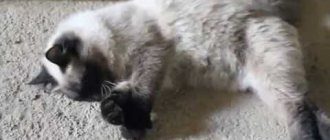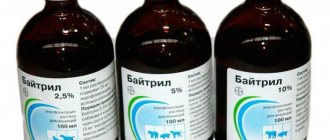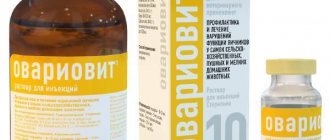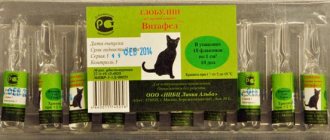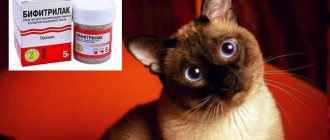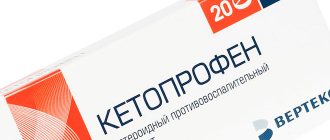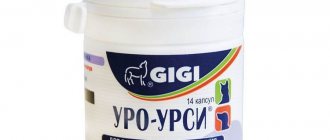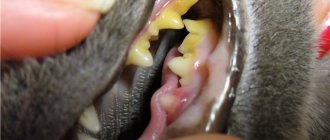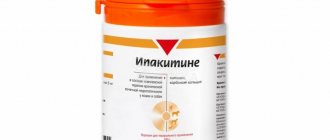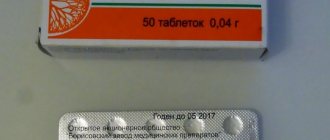Composition and action
Veracol is a homeopathic remedy that contains several medicinal components, including:
- white arsenic. The toxic substance is absolutely safe in homeopathic doses. It promotes the rapid destruction of pathogenic microflora, increasing the pet’s body’s resistance to negative environmental factors;
- bitter pumpkin – has analgesic and antispasmodic effects, helps neutralize and quickly remove toxins from the body. In the intestines it forms a protective film that protects the walls of the organ from irritation;
- white hellebore. The extract of a medicinal plant eliminates nausea, vomiting, normalizes intestinal motility, relieves spasms of the stomach and intestines, normalizes salivation;
- thyroid noid. The plant extract normalizes digestion, relieves chronic diarrhea, and has a healing effect on ulceration of the intestinal mucosa.
Important!
The components of the drug and their combination are not addictive, so the drug can be taken for a long time.
Veracol helps normalize digestive processes, eliminate diarrhea and vomiting, and other signs of gastrointestinal distress. It restores damaged mucous membranes of the stomach and intestines and stops the spread of infection.
The drug is available in several dosage forms:
- injection solution. It has maximum efficiency and speed of action, since it immediately enters the bloodstream, from where it is transported to the site of inflammation;
- drops and solution for oral administration;
- pills.
Brief characteristics of the drug
"Veracol" for cats, if you follow the instructions for use, has a beneficial effect on the gastrointestinal tract, relieves spasms, helps restore the digestive process and is an effective remedy in the fight against infections and inflammatory processes in the gastrointestinal tract. The drug has a long-lasting effect.
Important! The cat's stomach can absorb meat foods and small quantities of plant foods for the body's benefit. Their liver is weaker than that of humans, so it easily processes only natural products.
Purpose
The homeopathic drug Veracol is used by veterinarians for the following diseases of the gastrointestinal tract:
- gastritis;
- gastroenteritis;
- intestinal spasms;
- colic;
- chronic diarrhea;
- dyspeptic syndrome;
- poisoning, etc.
Important!
The drug is compatible with other medications, therefore, as part of complex therapy, Veracol is used in the treatment of any diseases accompanied by pain in the abdominal cavity.
Diseases of the gastrointestinal tract can be caused by various reasons - from diet violations when feeding low-quality feed, unsuitable food for the animal to inflammatory processes in the intestines, infectious diseases, and insufficiency of digestive enzymes in the body. Only a veterinarian can carry out diagnostics and establish a diagnosis.
Among the most common gastrointestinal diseases in cats is acute gastroenteritis. This is an acute inflammation of the digestive tract caused by ingestion of spoiled food, ingestion of inedible objects, toxic substances, including poisonous plants, helminthiases, food allergies, etc.
Young cats are often diagnosed with colitis, an inflammation of the colon that is characterized by painful bowel movements and the appearance of mucus and blood in the feces. The causes of colitis may be an incorrectly selected diet, food allergies, ingestion of inedible objects that irritate the gastrointestinal tract, the presence of polyps and tumors in the intestines.
Intestinal dysfunction – diarrhea and constipation. Diarrhea can be caused by eating spoiled food, infections, stress, and the presence of intestinal parasites. Constipation is caused by dehydration, insufficient fiber in the feed, ingestion of foreign objects (including wool), tumors in the intestines, injuries, pathologies of the spinal cord and nervous disorders, asthenia, endocrine and metabolic disorders, and insufficient physical activity.
Pancreatitis - inflammation of the pancreas - can be infectious or non-infectious in nature, but most often it is characterized by impaired blood supply due to dehydration of the body, provoked by infections or injuries. With endocrine pancreatic insufficiency, the cat loses weight due to increased appetite. The pathology develops as a consequence of chronic pancreatitis.
These and other gastrointestinal pathologies require medical intervention, and veterinarians prescribe Veracol in combination with other medications.
Veracol for cats instructions for use
It is recommended that you consult your veterinarian before using a veterinary product . The doctor must make a diagnosis and prescribe appropriate treatment.
Also study information about the drug: Azinox for cats
According to experts, the most effective is the injection form of the drug. Because it guarantees that a sufficient amount of medicine enters the body of a sick animal. The medicine is administered subcutaneously and intramuscularly.
If the pet owner prefers the capsule form of the drug, then the most convenient way to feed it to the cat is to grind the tablet and mix it with his favorite food. One of the advantages of the tablets is that they have absolutely no taste. The cat will not feel “foreign” smells or unusual tastes when eating its favorite treat.
Medicine drops are instilled directly onto the cat's tongue.
They also have no taste. It is important to remember that after handling the drug you must wash your hands thoroughly with soap. The injection conditions must be sterile to prevent infection.
For what diseases is Veracol used?
This drug has a fairly wide range of uses. Veterinarians usually prescribe Veracol to cats suffering from the following ailments:
- acute and chronic diarrhea;
- gastritis;
- constipation;
- flatulence;
- intestinal dysbiosis;
- painful digestion;
- worms;
- inflammatory processes of the gastrointestinal tract.
Contraindications
If the correct dosage is observed, Veracol has no contraindications or side effects. After consultation with a veterinarian, the medicine should be used according to clear instructions to avoid overdose.
Contraindications include acute infectious diseases and obstruction of urolithiasis. It is recommended to carry out therapy in the absence of signs of intoxication.
Features of application
The treatment regimen is determined by the veterinarian after conducting the necessary tests and examining the animal. It will depend on the final diagnosis. For the treatment of acute gastritis and gastroenteritis, Veracol is prescribed twice or thrice a day, the course of treatment is 5 days. For chronic pathologies, it will be long - up to 2-4 weeks.
A homeopathic medicine for intestinal colic and flatulence is used 2-3 times a day for 5-6 days. The drug is used in the same dosage for dyspeptic syndrome, accompanied by vomiting, nausea, and discomfort in the abdominal area. Stop taking the medication after the symptoms have completely disappeared.
Veracol is used for poisoning - depending on the severity of the condition, the medicine should be given 1-3 times a day until the cat’s condition stabilizes. To increase effectiveness, you can combine the drug with other homeopathic remedies.
Drops and tablets can be mixed with food, your cat's favorite treat, or a small amount of water. It is better to give the medicine forcibly - so that the required therapeutic dose gets into the pet’s body. It is 1 drop per 1 kg of body weight or 1 tablet - regardless of the cat’s weight.
Important!
Kittens should be given half a tablet.
Injections can be given subcutaneously or intramuscularly. For a subcutaneous injection, you need to slightly pull back the skin on the withers, insert the needle at an angle of 45 degrees and slowly inject the medicine. Intramuscular injections are made into the muscle on the hind leg. The needle should be inserted 1-1.5 cm, and the medicine should be administered quickly. If several injections are prescribed, you should alternate paws. The dose is 0.1 ml per 1 kg of cat's body weight, but the minimum amount of the drug is 0.5 ml.
Reviews
Tatyana, 38 years old, Chelyabinsk
“They found pancreatitis in my Toffee, they said it was due to cheap food (they fed Pedigree). The veterinarian prescribed several medications, including Veracol. I injected myself twice a day under the withers. After 5 days, Toffee began to show interest in food again. I don’t know exactly what medicine helped, but now I always keep Veracol at home just in case.”
Oleg, 31 years old, Novokuznetsk
“Never give your dog any medication without consulting your veterinarian! I have a mongrel dog, picked up on the street. A couple of months ago I noticed that he was not eating well, and after a while diarrhea appeared. I read about Verakol, took it for a week, and the dog’s condition returned to normal. A month later everything happened again, we went to the vet, it turned out to be helminths. The doctor said that Verakol simply muffled the symptoms, and the poor animal suffered all this time.”
Side effects and restrictions
Veracol has no contraindications; it can be used to treat young kittens and pregnant, lactating, and elderly animals. The medicine has no negative side effects; the limitation is the individual reaction of the animal’s body.
Veracol can be used in complex therapy, combined with other homeopathic remedies. In rare cases, skin reactions in the form of rash, peeling and itching of the skin are possible; these are grounds for replacing the drug.
Release forms
The standard type of Veracol is 2 or 5 ml ampoules. They are packed in plastic packages of 5 pieces each, and then placed in cardboard boxes. The name and quantity of the drug is written on each ampoule.
There are other forms of release of the product:
- Bottles with a volume of 10 to 500 ml with solution for injection. The drug is the same as in small ampoules, only there is more of it.
- Drops for oral use. Supplied in 20 ml polymer bottles with a dispensing nozzle at the end.
- Pills. Packed in 50 pieces in polymer containers with a screw cap.
Veracol is not available in other forms. Some people confuse tablets with capsules or drops with syrup, but there are no such products.
In what cases should I take it?
As you can understand, the effect of using the drug is mostly positive. But in what cases can its appointment be called completely justified? Here are the main pathologies during which Verakol for animals has proven itself only from the best side:
- Diarrhea of all etiologies, chronic as well as acute.
- During the treatment of gastritis, gastroenteritis, enterocolitis, as well as colitis and enteritis of various etiologies, not excluding cases of development of an infectious disease.
- Cases of bloating (flatulence), which will be caused by colic in the intestines and special spasms.
- Acute and chronic type of dysbiosis. The remedy is especially effective during the treatment of poisoning, which is accompanied by massive death of the mucous membranes inside the intestines.
- This remedy can be prescribed to dogs that suffer from a chronic form of digestive system disorder due to poor quality or unbalanced nutrition.
- Experts say that the drug is able to normalize the general secretion of the glands of the small and large sections in the intestine.
The exact time of treatment is determined by the veterinarian depending on the main symptoms that appear in the dog. Sometimes (during mild food poisoning) it will be enough to give a few injections, while in other cases the remedy will have to be used for several weeks.
We also recommend reading: Instructions for the use of Tsiprovet eye drops Instructions for the use of Covertal Cerucal in injections: dosage for a cat Symptoms and treatment of microsporia in dogs What antibiotics should be given for dogs when treating bacterial infections?
Possible side effects
Despite the fact that the homeopathic remedy contains microdoses of active ingredients, in some animals experts observe hypersensitivity reactions to any of the components of the drug. They manifest themselves in the form of a rash, itching and (or) peeling of the skin. This situation is a reason to stop taking Veracol and change the treatment regimen. If the symptoms do not go away on their own within a short period, a dose of an anti-allergenic drug is recommended for the animal.
According to experts, cases of intolerance to the components of Veracol are quite rare. In general, the drug is well tolerated and does not cause side effects.
The homeopathic remedy Veracol combines well with any other medications, so it can be used in complex regimens simultaneously with antibiotics, painkillers, antitumor medications, and medications from other groups.
How much does it cost and where to buy
The price of Veracol is quite acceptable for most cat owners. It depends on the form of release:
- solution for injections 10 ml – 280-300 rubles;
- tablets 50 pcs. – 140-170 rubles;
- drops for oral administration – 245-270 rubles.
The injection solution is sold in almost all veterinary pharmacies, but drops or tablets can be more difficult to find, especially in small provincial towns. An alternative may be to purchase the drug in an online store.
You can now view the current price of the drug and buy it right here:
Storage conditions
To prevent the drug from deteriorating during use, it is important to comply with its storage conditions. The manufacturer indicates that it is recommended to store Veracol in a dry place, away from children and animals. Do not expose the packaging to direct sunlight. When properly stored, the drug remains effective for 3 years. Veracol has a gentle effect on the pet’s gastric tract, ensuring a speedy recovery without adverse allergic reactions. It is recommended to use drops or injection solution after diagnosing the problem.
Inject a cat subcutaneously (at the withers)
Visit the profile section of our Medical Examination forum or leave your feedback in the comments below. More opinions means more useful information, it will be useful to someone. If there are good and interesting videos on the topic of the article, write and I will insert them into this publication.
Effect of the drug veracol
In terms of the degree of impact, veracol is a low-hazard and non-toxic drug. It has a positive effect on gastrointestinal motility, slows down peristalsis, and also has a local anti-inflammatory effect. Active substances after introduction into the animal’s body do not accumulate in it, therefore, productive animals, regardless of the time of treatment, can be used for food purposes, this applies to both meat and dairy products of productive animals. Due to the substances included in its composition, milk from cows and goats may have a slight bitter taste during treatment.
